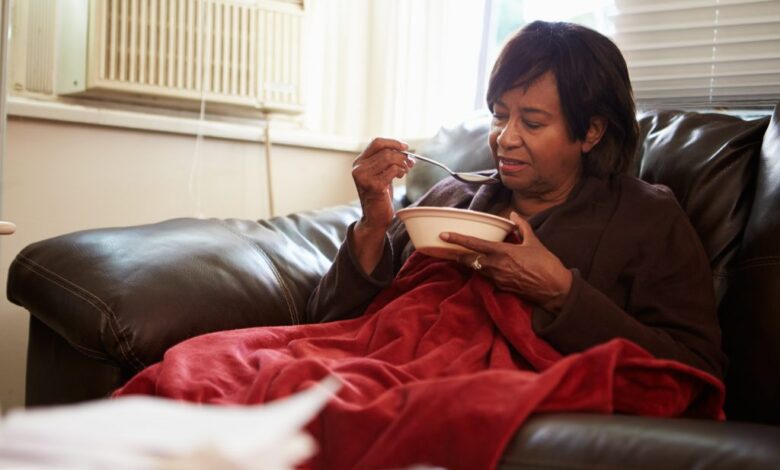Call for NHS to do more to deliver services that poor can access

The NHS must become more accessible to those living in poverty, a new report has suggested, but health leaders have said more must also be done by ministers to tackle economic inequalities.
A report by the King’s Fund, commissioned by the Joseph Rountree Foundation (JRF), has concluded that the NHS “has a role to play” in addressing poverty, both within its workforce and for patients.
“Growing health inequalities across communities are putting additional demand on nursing staff working in an already over-stretched health sector”
Nichola Ashby
The report used evidence from the Office for National Statistics, Office for Health Improvement and Disparities, the JRF, NHS England and interviews with nursing and other healthcare staff.
The pressures from the cost of living, the report found, were having a negative impact on the mental and physical health of around 60% of the most deprived people in the country.
Access to care for impoverished people was a problem, it noted. “Poverty creates practical difficulties in seeking treatment,” the report stated.
For example, it highlighted that around 14% of the most deprived not having access to the internet at home, compared to 2% of the least deprived. The cost of travel to appointments was also a challenge.
Alongside NHS charges and a “stigma” of poverty, these could be “prohibitive” for people in the lowest socio-economic divisions, with those in more deprived areas more likely to wait longer for non-urgent treatment.
In turn, the report highlighted the link between accessing the NHS and poor health outcomes such as the longer waiting times, poor vaccination uptake in deprived areas, more emergency admissions due to disease or injury.
As well as this, a correlation was seen between poverty and longer critical care stays not being treated soon enough or more co-morbidities, and higher mortality rates for diseases including dementia, diabetes and chronic obstructive pulmonary disease (COPD).
The report called on the NHS to work to improve the accessibility and knowledge about local services, as well as work to remove the stigma of poverty.
“Despite the scale and complexity of the problem, the NHS can make a difference, through raising awareness of poverty in patients among staff, taking action to meet the needs of those experiencing poverty and using its voice to advocate for tackling poverty,” it said.
However, it suggested that system-wide action was required too, in order to have a significant impact on reducing the causes of poverty in the first place.
The report stated: “It is important to note that while more deprived areas shouldn’t be underserved, even if this was corrected, the impact of poverty on illness and NHS services would not be solved.
“While there are things the NHS can do in this space (assuming they have the capacity and funding), alleviating the root causes of poverty is not a problem for health services alone,” it said.
The report authors highlighted that the NHS could “only treat the symptoms of poverty”, and called for “action” from the government and society at large to address poverty.
The report also flagged that NHS staff were impacted by poverty, but in different ways. They could experience poverty directly themselves, as well as treating patients who were experiencing its effects.
“Poverty among NHS staff is a large and growing problem,” said the report, which was published today and is titled Illustrating the relationship between poverty and NHS services.
“71% of providers report that staff struggling to afford to travel to work is a significant issue, and 42% report that staff are struggling to afford to eat at work.
“This affects staff health, which in turn affects the NHS in terms of increased sickness absence,” it noted.
Nurses and doctors also told the authors of the report that they experienced moral injury – sustained and enduring negative moral emotions like guilt or anger – due to the impact of poverty on patients.
Dr Nichola Ashby, the Royal College of Nursing’s deputy chief nurse, said a stronger preventative healthcare workforce, including nurses, would help close the inequalities highlighted by the report.
However, Dr Ashby said nurses were often “powerless” to stop the root causes. “Every day, nursing staff see the impact poverty has on people’s health,” she said.
“Growing health inequalities across communities are putting additional demand on nursing staff working in an already over-stretched health sector,” she said.
“The public health nursing workforce supports new families and young children, undertakes interventions on smoking and sexual health, gives vaccinations and carries out screenings for infections and diseases.”
But Dr Ashby said the public health nursing workforce has been “decimated” over the last 10 years, pointing to the reduction in the number of health visitors by around 30% since 2015.
She added: “Failing to tackle poverty doesn’t just cost people their health, it impacts wider society too. Inadequate preventative support increases pressures on the NHS and other vital services.
“Closing health inequalities means investing in vulnerable communities with stronger welfare support – alongside investing in the public health nursing workforce which delivers vital health interventions.”
Sir Julian Hartley, chief executive of NHS Providers, also called for more investment in the NHS and beyond to tackle poverty.
“It’s vital the government recognises how important investment in public health is in reducing rates of poverty to tackle the many factors behind deep-rooted health inequalities,” he said.
“Much more funding is needed if we are going to reverse the effects of years of local public health cuts which have undermined efforts to improve people’s physical and mental health and wellbeing and added to strain on stretched NHS services.
“A healthy economy relies on a healthy population. The government and the NHS must work hand in hand to create the picture of health we all want to see.”
Dr Layla McCay, director of policy at the NHS Confederation said: “NHS leaders will be incredibly concerned by these stark findings.
“The analysis once again highlights the glaring preventable inequalities often found in the most deprived areas, proving more should be done to address the root causes of poverty,” she said.
Like the other organisations, Dr McCay highlighted that, while there was a role to play for the NHS, there was also a key role for the government, especially when it came to investment.
“There needs to be a greater shift towards preventative health and care services which will save money in the long run, improve population health and reduce health inequalities,” she said.
“We also need to see further investment in long term planning and an increase in NHS capital spending to at least £14.1bn annually, as well as an ongoing commitment to further funding for the NHS Long Term Workforce Plan and targeted investment in community care and health equity in all policies to help drive down national and local inequalities in health.”






